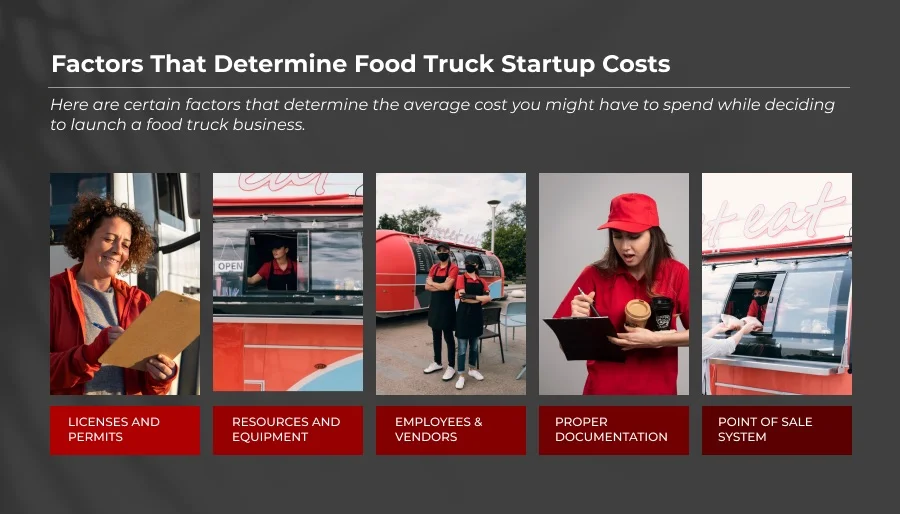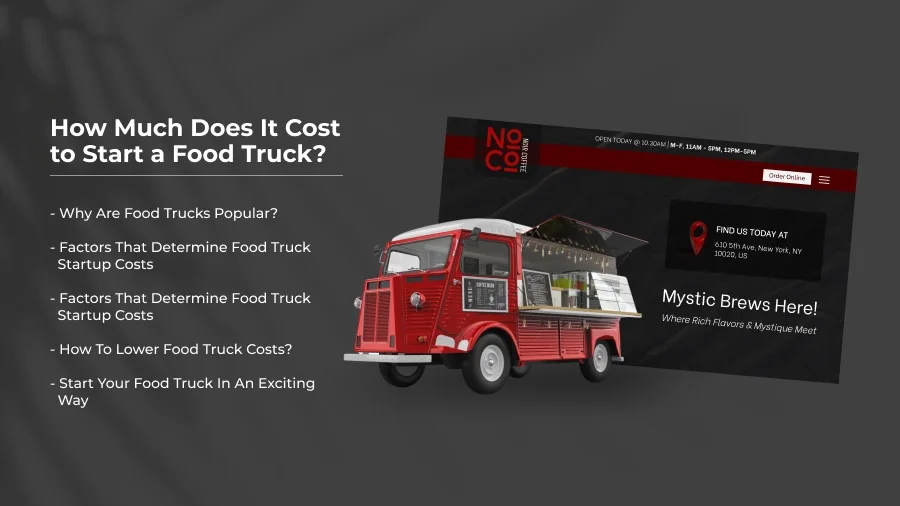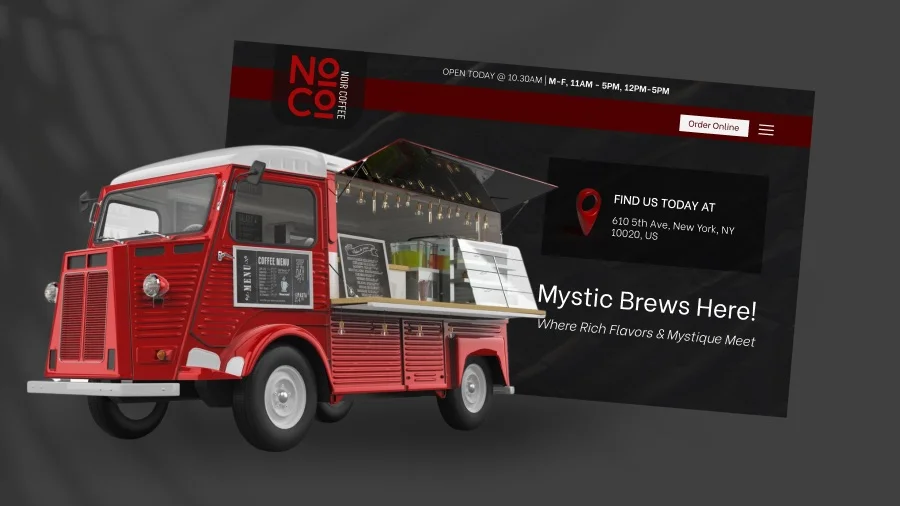How Much Does It Cost to Start a Food Truck?
Starting a restaurant involves great effort, time and financial resources. This could be particularly daunting if one is new to the food industry. That is when a food truck becomes a viable option for those seeking to learn about the way the food industry functions. Since food truck cost and overhead are low, they involve minimal staff and are mobile, they are looked at as the most affordable way to serve food.
Food trucks initially began as a fad. But they have now transformed to mainstream food business as more and more Americans have begun embracing the culture of mobile restaurants. As a result, new entrants to the industry, aspiring chefs and restaurant-industry entrepreneurs prefer trying out this mobile mode before setting foot into a robust food business model.

Starting out with a mobile operation is seen as a safer option as one can try out different neighborhoods, test and change menu items as per demand and build a loyal customer base before taking a plunge through a full-fledged restaurant.

Although starting a food truck will cost much less than opening a brick-and-mortar restaurant, it still involves a sizable price tag. Where you operate, what you serve and how you run the business will impact the capital required for starting and running a food truck.
You will need to spend money on buying and filling the truck and meet the typical everyday expenses as well. This blog lets you know the cost of starting a food truck that goes well beyond the initial startup fund.

Factors That Determine Food Truck Startup Costs

1) Licenses And Permits
The Food Truck Index of the U.S. Chamber of Commerce states that a food truck owner needs to spend an average of $28,276 on permits, licenses and other legal compliances. The necessary permits and licenses fall under five categories namely – administrative; health/menu/food safety; vehicle requirements and safety/hazard prevention; employment and zoning. Costs vary according to the location. The food truck friendly cities in America are Portland, Denver, Orlando, Philadelphia and Indianapolis. The toughest cities are Boston, Washington D.C., San Francisco, Minneapolis and Seattle.

The cost of administrative permitting for food trucks in Denver is $811 while the cost in Boston is an exorbitant $17,066. So, before deciding where to launch the food truck business, do not forget to consider the location-specific fee that needs to be spent on permits and licenses.
2) Resources And Equipment
A major part of the fund must be allocated for the food truck. This cost will vary depending on whether you are buying a new food truck, an already used one or simply renting a vehicle. The price of a brand new, customized truck ranges anywhere between $75,000 and $150,000 as they take months to build. The price of a used food truck starts from $40,000 and goes up to almost $80,000. The advantage is that one can start operating them almost immediately. The cost of renting a food truck depends on the duration of the lease. If it is for six months or more, it is likely to cost $2,000 to $3,000 per month.
3) Recruiting Employees And Vendor Selection
Hiring a team is quite easy in the case of a food truck as you will not require a full-fledged fleet of people like restaurant staff. A food truck requires a maximum of 3 employees. Staff wages are likely to vary from state to state. The minimum wage per hour is about $7.25 while the average wage for a food truck manager is $12.11. Apart from the staff, one also needs to source reliable vendors to make the food truck a successful venture.
4) Proper Documentation
Launching any business involves getting the paperwork done thoroughly. Although the food truck is a mobile business, it still requires proper paperwork to be done. The permits and licenses required for a food truck include Employer Identification Number, business license, vehicle license, seller’s permit (applicable for certain states only), food safety/food handler’s permit, health department permit and fire certificate.
5) Point Of Sale System
Choosing the right payment solution for the business is essential as food truck customers wish to be served as quickly as possible. Customers who opt to eat from a food truck also look for a variety of ways to make their payment. Thus, purchasing a robust Point-Of-Sale (POS) system to process payments quickly and efficiently becomes necessary. This POS will help accept all common payment methods. The cost of the POS will depend on the features that you choose.
6) Necessary Kitchen Equipment
The equipment required for a food truck depends on the type of cuisine and food that you are going to serve. Mandatory appliances for any food truck would include ovens, fryers, grills and refrigerators. The essential equipment includes pots and pans, storage containers, knives, serving cutlery and a few other utensils. The cost of the appliances and other kitchen tools will depend on whether you are buying them new or opting for used ones. The startup cost for ingredients depends on the menu.
Considering ingredients like cooking oil, spices and much more, you can expect your expenses to range between $1000 to $2000 dollars. Serving plates, cups and miscellaneous cutlery might cost up to $300. During the launch of a food truck, you will be dealing with several expenses. So, it is advisable to lease appliances and start operations. Eventually, you will get to know what you really need based on which you can reinvest to purchase new ones.
7) Operational Costs
Expenses on food form a minor part of the food truck costs. Major spending needs to be done on gas, insurance, permits, licenses, maintenance, equipment and supplies. These factors must be considered while formulating the budget to figure out the best ways to profit-making. Fuel and maintenance costs tend to vary but mostly fall between $500 and $1000. With wise planning and efficient management, operational costs can be lowered.

How To Lower Food Truck Costs?
- Design a versatile menu that requires only seasonal ingredients
- Purchase ingredients in limited quantities. Avoid overbuying
- Use near and dear ones as staff when you start off to figure out how many staff members are needed at different times.
- Do not buy brand new, sophisticated tools and devices. Instead, opt for renting or buying used equipment.
- If any location is fine with you, launch the food truck in a city with low regulatory fees and a market with more opportunities
- Focus not only on weekday lunch hours but on other lucrative events like weddings, graduation parties, late-night crowds, etc.
- Foster a bonding with fellow mobile restaurateurs and buy ingredients or supplies in large quantities
- Build an audience on social media platforms rather than using cost-prohibitive traditional advertising
- Maintain the truck in good working condition through regular services and proper usage
- Analyze the prices of all business vendors and choose the one that offers the best competitive price
Other costs associated with food trucks include:
- Insurance – $2,000 to $4,000 per annum
- Uniforms – $0 to $1000
- Paper products like napkins, plates, etc. – $200 to $300
- Website – $0 to $5,000
Start Your Food Truck In An Exciting Way
Launching a food truck is a great way to set foot into food entrepreneurship. But, with lack of education regarding this mobile business, it can get complex as well. Understanding food and labor cost control, inventory and purchasing and communications is essential to make a breakthrough in the industry.
KEY TAKEAWAY!


